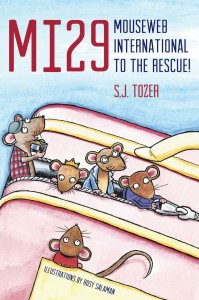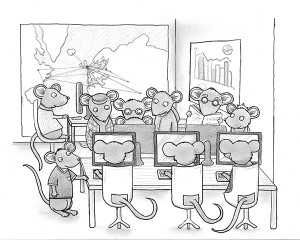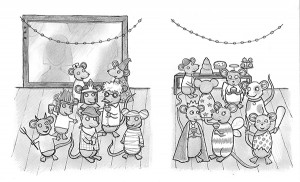 In this Q&A, MI29: Mouseweb International to the Rescue! author S. J. Tozer discusses how her daughter’s recovery from a chronic illness inspired her to write the story of MI29, a network of secret agent mice ready to lend a paw when we need it most, and how she hopes the tale will encourage children to live their lives more positively.
In this Q&A, MI29: Mouseweb International to the Rescue! author S. J. Tozer discusses how her daughter’s recovery from a chronic illness inspired her to write the story of MI29, a network of secret agent mice ready to lend a paw when we need it most, and how she hopes the tale will encourage children to live their lives more positively.
The idea of a network of secret-agent mice helping out us humans is such a fun concept, but what inspired you to come up with the original idea?
As a child, I used to love reading books about secret worlds operating just around the corner from the real world – Narnia at the back of the wardrobe in C.S. Lewis’ stories or the ‘Borrowers’ living in the walls and floors of a house in Mary Norton’s tales. I knew when I started to write that I wanted to create a similar sort of situation. As a youngster, I kept a succession of hamsters as pets and was allowed to keep each one in a cage in my room. They were all very good escape artists – particularly at night (when they would bite the rungs of their cage incessantly) so the idea fomented in my mind that they would spy on me and wait for me to go to sleep and then meet up with other children’s pets as in the fairy tale the ‘Twelve Dancing Princesses’. I imagined mice would be no different to hamsters in their behaviour. Over the years, I have also enjoyed the exploits of James Bond and watched these films from an early age clandestinely at first with my teenage babysitter! I particularly liked the gadgets created for 007 by ‘Q’. Just before I started to write, I read an article about new spying technology, cameras and listening devices as small as an insect and able to fly – a bug, literally. This fascinated me and gave me the idea of the mice having tiny and clever ‘Questors’, networks and mainframes that would help them to spy on people. The idea of MI29, an obscure branch of the secret service, followed naturally.
 The theme of small things behind the scenes being able to make a huge impact on someone’s life seems like an important aspect of the book. Do you think that’s true?
The theme of small things behind the scenes being able to make a huge impact on someone’s life seems like an important aspect of the book. Do you think that’s true?
Yes I do think that is true. The technology and information revolution we are experiencing at the moment has had a huge impact on people’s lives but it has also increased our vulnerability to be manipulated by those operating the computers and their vast databases. I was one of the last classes in my school not to receive any formal computer training. In fact I didn’t touch a computer until I started work aged twenty two – despite doing a Chemistry degree! That would be unheard of now, of course. I also studied Psychology for a year at University and was really amazed by the interesting humane experiments performed on animals to induce particular logical behaviours. My imagination leapt to thinking that given enough time watching humans, mice could learn how to operate tiny computers.
Why are the rats so unpleasant to the poor mice from MI29? What can children learn from them do you think?
I’ve never liked rats – they just look evil don’t they! I wanted to have the old battle between good and evil at the heart of the story and children always like happy endings.
The girl that MI29 are helping out in the story, Lily, is obviously very unwell. How important do you think it is to show that she is able to repay the favour and help them by telling their story?
My daughter was very unwell as a young child and MI29 was started as my way of trying to comfort both her and her brother. For about three years she was severely disabled by a rare condition of the hip joint. She had been quite a physical child enjoying ballet, sport, country walks and the like and all this had to stop straight away as she was in such pain. It was a horrible time made worse by some insensitive teachers at her school. Thankfully, she is absolutely fine now. I wanted to write a story that had some of the elements of her story at its heart as I had been so moved by her predicament – it was my first encounter with the world of disability. When I began writing, I hadn’t come across any children’s literature with a disabled child as the hero or heroine who wins through in the end. However, I wanted more than that. I wanted Lily to be empowered by her experience of MI29 and capable to return the favour. So many disabled children feel powerless and always at the receiving end of help and charity. I wanted my heroine to do something really special and give something back to the organisation that helped her. I wanted to give Lily back her dignity and self-worth.
 At one point Windsor, an Alpha agent of MI29, explains to his children: ‘We’re all spies in our various ways. It’s the way you use the information that counts’. Do you think that is an important lesson for children to take away from the book too?
At one point Windsor, an Alpha agent of MI29, explains to his children: ‘We’re all spies in our various ways. It’s the way you use the information that counts’. Do you think that is an important lesson for children to take away from the book too?
I do think it is very important. We all live truly unique lives from second to second and can learn important lessons from these experiences, if we have an open mind. For me, the important thing in life is to do something useful, positive, big or small that contributes to society in some way and that can be your legacy – something you can look back on and smile about. I think it is important to support causes that are meaningful to you and, if you can’t give financially, you can always give the most precious thing of all – your time. It is important to keep the capacity to be moved by things as it is an expression of our humanity.
As well as being a really enjoyable adventure story, what is the overall message that you hope children will take away from MI29?
I hope that children might learn to live their lives helpfully and positively – as if some organisation or someone like God was spying on them with the power to influence either way the twists and turns of their lives.
Read an extract from the book here…